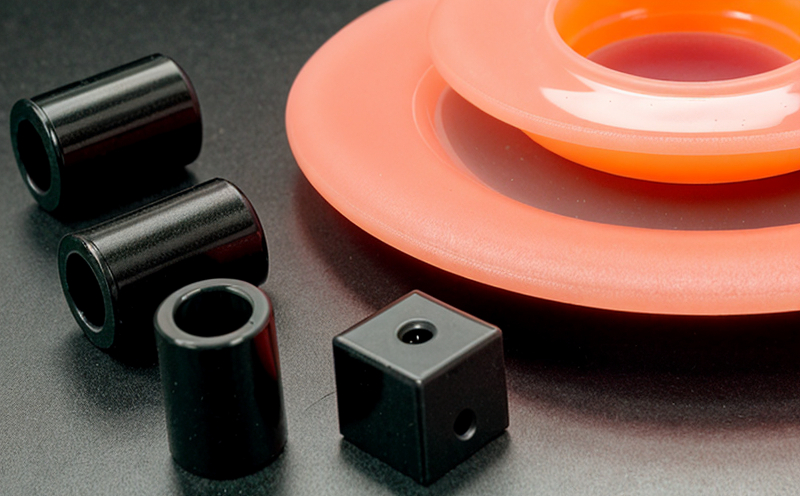UL 1581 Heat Resistance Testing of Plastic Leisure Products
The UL 1581 standard is widely recognized as a benchmark for ensuring that electrical components and materials are heat resistant to withstand the temperatures they may encounter during normal use. In this context, its application extends beyond traditional electrical equipment into various sectors, including sports and leisure products where plastics play a critical role in enhancing performance and safety.
Our laboratory specializes in conducting UL 1581 heat resistance testing on plastic materials used in leisure products such as outdoor furniture, beach chairs, and recreational vehicles. This service ensures that the plastics not only meet regulatory requirements but also perform reliably under real-world conditions. By partnering with us, you gain access to expertise in materials science, thermal analysis, and quality assurance processes specifically tailored for this demanding standard.
The testing process involves subjecting samples of plastic materials to controlled heating environments designed to simulate worst-case scenarios encountered during product usage. Specimens are exposed to temperatures ranging from 135°C up to 260°C depending on the material type, ensuring that any potential flaws or weaknesses are identified before reaching the market.
During testing, our professionals carefully monitor changes in physical properties like dimensional stability, color retention, and mechanical integrity. Our advanced equipment allows us to detect even minor deviations from expected performance levels which could impact long-term durability or safety of end-user products. Compliance with UL 1581 goes beyond mere certification; it reflects a commitment to delivering superior quality that exceeds industry expectations.
Our team uses cutting-edge analytical techniques including differential scanning calorimetry (DSC), thermogravimetric analysis (TGA), and dynamic mechanical analysis (DMA) to gather comprehensive data about the thermal behavior of tested plastics. This information helps clients understand how their materials will behave in different temperature ranges, guiding them towards making informed decisions regarding formulation adjustments or material selection.
By choosing our UL 1581 heat resistance testing service for plastic leisure products, you benefit from access to state-of-the-art facilities staffed by experienced professionals who possess deep knowledge about this standard. We pride ourselves on providing accurate results that stand up against rigorous scrutiny while offering personalized support throughout the testing process.
The importance of UL 1581 compliance cannot be overstated, especially when dealing with products exposed to harsh environmental conditions or high heat stress situations. Our comprehensive approach ensures not only regulatory adherence but also enhances product performance and reliability, ultimately contributing to customer satisfaction and brand reputation.
Applied Standards
The UL 1581 standard is primarily applicable to electrical components made from plastic materials intended for use in dry or damp locations. However, its principles can be extended to other sectors such as sports and leisure products where similar thermal challenges are present.
- UL 94: This related standard addresses the flammability of plastics used in electronic devices. While not directly applicable to UL 1581, understanding both standards helps ensure comprehensive compliance across multiple aspects of product safety.
- ASTM D638: Measures tensile strength which is crucial for assessing how well a material withstands stress under load conditions – an important factor when evaluating the durability of plastic components in leisure applications like seating.
Our laboratory follows all relevant guidelines meticulously to ensure accurate results and reliable data interpretation. By incorporating these additional tests into our service offering, we provide clients with a holistic view of their materials' performance characteristics ensuring they meet not only UL 1581 but also broader industry standards.
Quality and Reliability Assurance
The quality and reliability of plastic leisure products are paramount to maintaining customer trust and satisfaction. Our laboratory plays a crucial role in ensuring that these materials consistently deliver superior performance across various environments. Through rigorous testing, we identify potential weaknesses before they become critical issues.
- Consistent Results: We employ standardized procedures and high-precision equipment to maintain consistent test outcomes every time. This consistency builds confidence among clients knowing their products will perform as expected regardless of batch or production run.
- Data Integrity: All measurements are meticulously recorded ensuring accurate reporting of results. Our systems are designed to prevent data entry errors, thereby enhancing the credibility of our findings.
- Comprehensive Reporting: Detailed reports accompany each test result providing insights into both strengths and areas requiring improvement. These reports serve as valuable tools for ongoing product development and quality assurance efforts.
We also offer follow-up services to help clients address any shortcomings identified during testing. Our goal is not just compliance but excellence, ensuring that every product leaves our facility with the highest level of integrity and reliability.
Environmental and Sustainability Contributions
Incorporating sustainability into manufacturing processes has become increasingly important as industries worldwide strive to reduce their environmental footprint. Our laboratory contributes positively to this initiative by offering environmentally conscious testing options for plastic leisure products.
- Reduced Waste: By identifying problematic materials early in the development stage, we minimize waste associated with failed prototypes or unsuitable components. This proactive approach reduces unnecessary resource consumption and landfill contributions.
- Eco-Friendly Materials Evaluation: We evaluate the suitability of eco-friendly plastics ensuring they not only meet performance expectations but also align with broader sustainability goals. This includes assessing recyclability, biodegradability, and overall lifecycle impacts.
Our commitment to environmental stewardship extends beyond our laboratory practices into educational initiatives aimed at promoting sustainable manufacturing practices among industry stakeholders. By sharing knowledge and best practices, we aim to foster a culture of responsible innovation that benefits both the environment and society.





